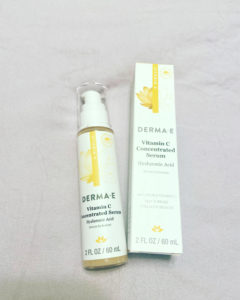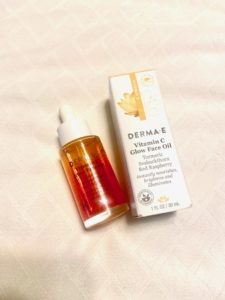If you’re thinking of adding a Vitamin C to your regime, but don’t know where to start, here are a few tips, plus our favorite finds.
Topical Vitamin C has many benefits when applied to the face—it can help slow down early skin aging, prevent sun damage, and improve the appearance of wrinkles, dark spots and acne. It’s an antioxidant, which means it fights free radicals, or toxins that come in contact with your skin from sources such as air pollution or internal sources like your metabolism.
According to Harvard Health Publishing journal from the Harvard Medical School, one study shows that daily use of a Vitamin C for at least three months can help the appearance of wrinkles of the face and neck, plus also improves the overall texture and appearance of the skin. Vitamin C can also help protect the skin from ultraviolet rays when used together with a sunscreen. The Harvard study also indicates that when Vitamin C is used in combination with ferulic acid and vitamin E, it can help diminish the appearance of redness and help protect the skin from long-term damage cause by the sun’s rays. Vitamin C can also help those with acne through its anti-inflammatory properties that can help control oil production within the skin. And, for those who apply Vitamin C two times a day, it can help reduce acne scars.
Vitamin C can come in strengths from 10 percent – 20 percent. If you have sensitive skin, like I do, start with a low percentage. I have rosacea, so my dermatologist suggested that I stay at 10 percent and not increase the strength as I go as it can cause a flare for those with sensitive skin. Also, another tip I received was to get my skin under control before adding Vitamin C to my regime. My dermatologist did not allow me to start using Vitamin C when my rosacea was at its worst. I had to get that under control before Vitamin C even became part of the conversation, even when I would ask. It’s since been about two years since I’ve had a flare, and I just started to use vitamin C.
Keep in mind that when starting with a new product, it is recommended you start with a patch test first to make sure you don’t have a negative reaction to the product. Also, only start one new product at a time.
If you’re wondering where in your regime does vitamin C fit in, it’s right after your cleanser and before your moisturizer and SPF.
Now, if you’re wondering which Vitamin C to use, well use the one that you enjoy. Try a few and find one you like or ask your dermatologist to suggest one that’s right for you.

When I first started, I chose a Vitamin C by La Roche Posay, because I knew that the brand created products for sensitive skin in mind. However, it felt sticky and gooey, and I couldn’t wait to finish the bottle and start something new. It wasn’t a pleasurable experience. When I asked my dermatologist for a suggestion, she mentioned brands like Mary Kay, or Derma-E. I went with Derma-E and that same night went to purchase their Vitamin C Concentrated Serum with hyaluronic acid, which is made up of 10 percent vitamin C, she informed me. While shopping, I saw the brand’s Vitamin C Glow Face Oil and was very intrigued by it—fast forward 3 weeks later and I couldn’t resist and added it to my regime. First, I wanted to make sure that I could tolerate the serum before adding a second option.

You’re probably wondering what’s the difference. Well, according to the brand’s website, the Vitamin C Serum Concentrated formula is a fast-absorbing, high-potency serum, which penetrates deeply to deliver antioxidant protection and hydration. The brand claims that the serum will brighten the appearance of your skin while retexturizing your complexion and encourages collagen health.

The Vitamin C Glow Face Oil claims to deeply nourish with golden mineral Mica and absorbs quickly for instant hydration. It also gives the skin a natural luminescence for a radiant glow. This oil is infused with stable vitamin C and golden Tumeric to brighten and even skin tone, while Seabuckthorn Oil antioxidant-rich superfoods such as red raspberry, cranberry and ginger root oils help nourish the skin. This oil also claims to improve skin’s elasticity and offers anti-aging benefits.




